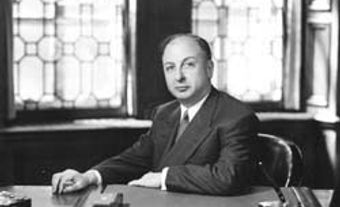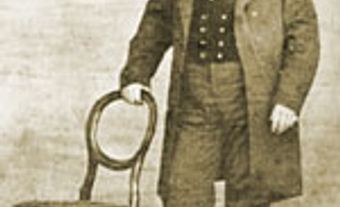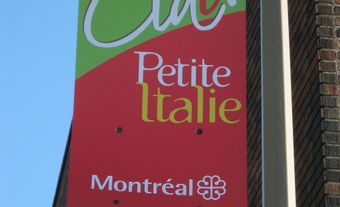Emanuele “Lino” Saputo, CM, OQ, businessman, dairy and cheese industrialist, philanthropist (born 10 June 1937 in Montelepre, Italy). Lino Saputo emerged from modest beginnings to develop one of the most prominent dairy companies in Canada — Saputo — now with operations in the United States, Argentina and Australia. His influence and family name is found throughout Montreal, Quebec, including on the Saputo Stadium, home of CF Montréal a professional soccer team that plays in Major League Soccer (MLS). His family is routinely listed among the wealthiest Canadians, reaching number three in 2017.

Early Life and Establishment of Saputo Inc.
In 1950, Lino’s father, Giuseppe Saputo, and eldest brother, Frank, immigrated to Canada from their Sicilian home. By moving to Montreal, the family followed a well-established trend for Italians immigrating to Canada. Two years later, Lino came to join Giuseppe and Frank with his mother, Maria, and five other siblings. At first, the 15-year-old Lino found the move difficult, and longed to return to Sicily. However, by 1954, his ambitions drove him to encourage his parents to return to cheese making, which had been the family business in Sicily. He scraped together $500 in savings for equipment and a delivery bike to support his parents, who made cheese in a rented room in the Delca Cheese factory on Rue de Rouen. The business quickly benefited from steady demand from fellow Italian immigrants, who longed for the products of home. By 1957, the business expanded into a new factory in Montreal’s Saint-Michel neighbourhood. The company further benefited from the increasing popularity of pizza during the 1960s, since it meant growing demand for mozzarella.
In 1964, Lino sought to convince his father to expand and modernize the company operations, particularly after touring the Grande Cheese Co. of Wisconsin, owned by a Sicilian American, Giovanni (John) DiBella. DiBella initially agreed to personally invest in Saputo’s operations, but then connected the Saputo family to Joseph Bonanno, a New York-based mobster. Bonanno agreed to invest $8,000 in exchange for a 20 per cent stake in the firm. The Saputo family was reportedly unaware Bonanno was a Mafia boss until reading about it in local newspapers. Though they expressed shock about Bonanno’s criminal ties and immediately broke off the deal, the Saputo family would occasionally struggle with allegations of Mafia connections. These allegations formed part of the context of a raid on the company’s factory by Montréal police in 1972, eventually leading to a total of $350 in fines for health violations — but no proven connections. Nonetheless, the rumours may have been a factor in the Ontario Milk Commission’s decision to reject the company’s effort to open an Ontario cheese factory in 1976.
Expanding the Business
Lino Saputo took over the family firm from his father in 1969, and began to expand the business. By 1981, the company secured their first acquisition outside Quebec, a cheese plant in Cooksville, Ontario. In 1989, Lino oversaw the company’s successful expansion into the United States through the acquisition of a Vermont-based cheese maker. Throughout this process, Lino remained firmly in charge of Saputo’s operations, reportedly tasting the product daily. The company remained entirely family held until its initial public offering in 1997. The sale of shares in Saputo Inc. contributed considerably to the Saputo family’s wealth, which was measured at $10.61 billion as of 2017. While Saputo Inc. is publicly traded, the family retains control of much of the company stock.
Lino’s interests also expanded beyond dairy. By 1989, he sat on the board of directors for a shipping firm, Cabano Expeditex (now TransForce), and for the National Bank of Canada. He forged a close relationship with now former National Bank chairman André Bérard. Lino considered his successful ten-year period with National Bank a vindication of the earlier allegations of family ties to Sicilian Mafia members, and Bérard stood behind him when he fought a revival of such allegations in 2007. As in the 1960s and 1970s, no direct evidence of those ties was discovered.
Right into the 21st century, much of Lino’s interests remained in overseeing the growth of Saputo Inc. He continued as CEO of the firm, but appointed Camillo Lisio, then executive vice-president, as chief operating officer in 1998. In 1999, the company orchestrated the purchase of Culinar Inc., a Quebec baked goods company that produced the popular Jos. Louis cakes, among other sweets. In 2001, Saputo Inc. expanded its national reach when it successfully acquired a Western Canadian collective of dairy cooperatives, Agrifoods International Co-operative (known more commonly as Dairyworld). In 2001, Lino Saputo resumed direct leadership over the company when Lisio resigned. Finally, in 2004, Lino Saputo Sr. resigned as CEO, completing a long-anticipated transition whereby one of his sons, Lino Saputo Jr., assumed the position.
Personal Life and Philanthropy
Lino Saputo is married to Mirella, and they have three children: Joey, Lino Jr., and Nadia. In 1979, Mirella and Lino launched a charitable foundation, the Fondation Mirella and Lino Saputo, which donates money to a wide range of causes, particularly helping sick and disabled children, women and seniors. The couple also contributed to the foundation of an Italian Canadian community centre in Montreal, the Centre Leonardo da Vinci, featuring the Mirella and Lino Saputo Theatre.
Lino is an enthusiastic car collector, particularly of vintage Cadillacs and other classic cars. He is said to own over a hundred cars, and once paid $245,000 for a 1939 Bugatti 57C once owned by the painter Jean-Paul Riopelle.
Awards and Distinctions
- Officier, Ordre national du Québec (2011)
- Member, Order of Canada (2012)
- Inducted, Canadian Business Hall of Fame (2014)
- Inducted, Circle of Great Entrepreneurs of Quebec (2018)

 Share on Facebook
Share on Facebook Share on X
Share on X Share by Email
Share by Email Share on Google Classroom
Share on Google Classroom








